AMD Ryzen 7000 series "Zen 4" CPUs: Everything You Need To Know
AMD's next-gen Ryzen 7000 series "Zen 4" CPUs are here: Ryzen 9 7950X, Ryzen 9 7900X, Ryzen 7 7700X, and Ryzen 5 7600X ready to rock and roll on AM5.
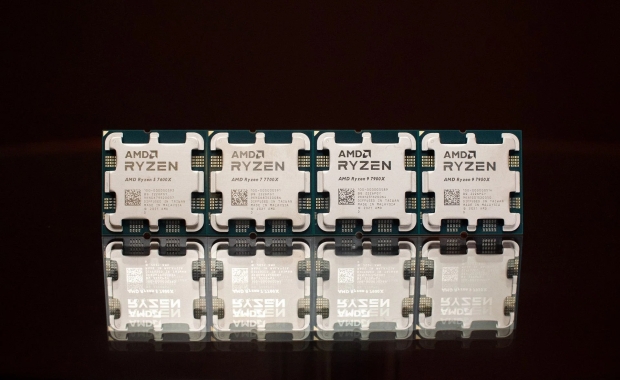
Introduction
AMD has formally introduced its new Ryzen 7000 series "Zen 4" processors, as well as its new X670 and B650 motherboards with all of their next-gen bells and whistles with the new AM5 socket, DDR5 memory, and PCIe 5.0 support.
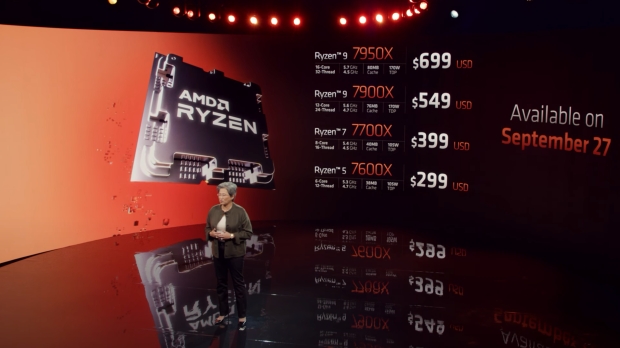
Since there is a lot to digest, we've got everything you need to know about AMD's new Zen 4 processors, what makes them tick, how good they are, the prices, the new motherboards, and everything else that you need to know. AMD has unleashed a considerable amount in a small time, and with only a few weeks until it all hits the market, consumers are going to be busy deciding what they need to prepare for when it comes to upgrading.
AMD announced four different members of its new Ryzen 7000 series "Zen 4" desktop CPU family, with the new Ryzen 9 7950X, Ryzen 9 7900X, Ryzen 7 7700X, and Ryzen 5 7600X processors. We're looking at prices between $699 and $299, with between 16-core, 32-thread Zen 4 processors down to mid-range 6-core, 12-thread Zen 4 offerings.

AMD offers its new flagship Ryzen 9 7950X at the top of the Zen 4 ladder, pumping way with 16 cores and 32 threads (no upgrade on thread count over the Ryzen 9 5950X) but at a much higher boost CPU clock of up to 5.7GHz, with 80W of cache in total, a 170W TDP, and a price of $399.
Under that, we've got the Ryzen 9 7900X with the cores and threads dropped to 12 cores and 24 threads, with a boost CPU clock of 5.6GHz, 76MB of cache in total, a 170W TDP, and a price of $549. With the two Ryzen 9 models out of the way, there's the Ryzen 7 7700X with 8 cores and 16 threads at up to 5.4GHz boost, a bigger drop to 40MB of cache, but a big drop down to a 105W TDP and a price of $399.
But it's AMD's new mid-range Ryzen 5 7600X processor with 6 cores and 12 threads that boost up to 5.3GHz, with 38MB of cache in total and a price of $299. It'll be the perfect CPU for a new B650E or B650 motherboard, giving you DDR5 memory and PCIe 5.0 support for GPUs and SSDs of the future.
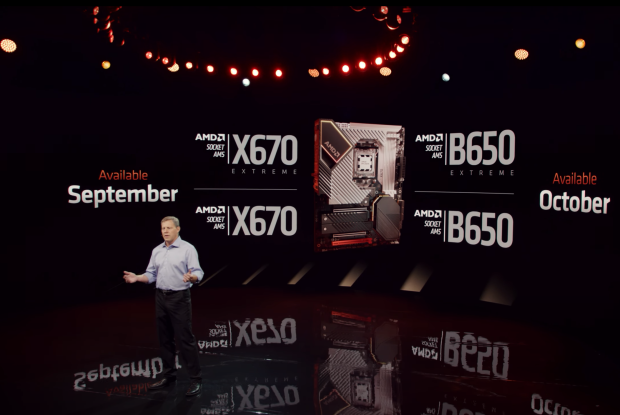
In terms of pricing, AMD is actually doing quite well on offering more cores, and more performance, for cheaper price points than its original Ryzen CPUs. If you compare the Ryzen 9 3950X (16 cores, 32 threads) which launched back in 2019, the new, and much more powerful Ryzen 9 7950X is cheaper than the 3950X when it launched.
AMD is pricing its Ryzen 7 7700X at $50 cheaper than the Ryzen 7 5800X when it launched, with the $299 price point on the Ryzen 5 7600X to offer B650-based systems some monster Zen 4 gaming performance on the cheap.

Under the Zen 4 Hood
Under the (Zen 4) Hood
AMD's new Zen 4 architecture is here, with the new Ryzen 7000 series "Zen 4" CPU architecture featuring an overhauled cache configuration, enhanced front-end design, native PCIe 5.0 support and DDR5 memory. Zen 4 also has integrated RDNA 2 graphics, new ISA extensions for AI, and AVX-512 support.

AMD is tapping TSMC's leading-edge 5nm process node technology, with 4th generation FinFET technology, an enhanced metal stack, and faster, smaller, lower power transistors optimized for high performance inside of the new Ryzen 7000 series CPUs.
The company notes that it has "multiple products in development" and that AMD has deep partnerships with TSMC and design automation vendor for enhanced PPA.
AMD <3 TSMC
TSMC has been an important and close partner of AMD during its time with the Zen and RDNA architectures, with the two companies continuing that relationship with the use of TSMC's new 5nm process node technology with the new Zen 4 processors. TSMC's new 5nm process provides a 15% boost in clock speeds over its 7nm process node, allowing AMD to boost over 5GHz for the first time with a desktop-class Zen CPU.

AMD's new Ryzen 9 7950X processor clocks up to 5.7GHz, even with its 16 cores and 32 threads of CPU horsepower and while it'll chew through 170W easily, the Ryzen 7000 series CPUs are 25% more efficient than Ryzen 5000 series CPUs. The reason? AMD's magic inside of the Zen 4 architecture (IPC improvements, clock speeds) and TSMC's 5nm process node.
Integrated RDNA 2 Graphics
AMD is including integrated RDNA 2 graphics on all of its Ryzen 7000 series CPUs, with the GPU cores not stored on the CPU dies (the clusters of CCDs) but rather on the I/O die. AMD is using TSMC's 5nm process node for the CPU, while the I/O where the GPU cores reside, is on TSMC's 6nm process node.
This means that if you install a new Ryzen 7000 series "Zen 4" CPU into your PC, and the motherboard you buy has an HDMI 2.1 port or DisplayPort connector on the I/O shield, then you'll have graphics ready to go.
AVX-512
There's also support for AI instructions based on AVX-512, which might not important to most people -- gamers especially -- but AVX-512 instructions can be used for things like VNNI for neural networks, and BFLOAT16 for inference. AMD calls its AVX-512 implementation as a "double-pumped" execution of 256-bit wide instructions to defray the frequency penalties that come with Intel CPUs when they're executing AVX-512 workloads.
Intel actually disables AVX-512 functionality on both their current-gen 12th Gen Core "Alder Lake" CPUs as well as the upcoming 13th Gen Core "Raptor Lake" CPUs, because they use a hybrid CPU architecture.
Ryzen 7000 Series CPUs: Detailed Specifications

AMD Ryzen 9 7950X detailed specifications
- Process Node: 5nm TSMC
- Architecture: Zen 4
- CPU cores: 16C/32T
- Base CPU clock: 4.5GHz
- Boost CPU clock: 5.7GHz
- Cache: 80MB (64+16MB)
- TDP: 170W
- Price: $699
AMD Ryzen 9 7900X detailed specifications
- Process Node: 5nm TSMC
- Architecture: Zen 4
- CPU cores: 12C/24T
- Base CPU clock: 4.7GHz
- Boost CPU clock: 5.6GHz
- Cache: 76MB (64+12MB)
- TDP: 170W
- Price: $549
AMD Ryzen 7 7700X detailed specifications
- Process Node: 5nm TSMC
- Architecture: Zen 4
- CPU cores: 8C/16T
- Base CPU clock: 4.5GHz
- Boost CPU clock: 5.4GHz
- Cache: 40MB (32+8MB)
- TDP: 105W
- Price: $399
AMD Ryzen 5 7600X detailed specifications
- Process Node: 5nm TSMC
- Architecture: Zen 4
- CPU cores: 6C/12T
- Base CPU clock: 4.7GHz
- Boost CPU clock: 5.3GHz
- Cache: 38MB (32+6MB)
- TDP: 105W
- Price: $299
AM5 Socket + DDR5 + PCIe 5.0
AM5 socket
AMD is using its new AM5 socket for the Ryzen 7000 series "Zen 4" processors, with an LGA1718 socket that sees the older AM4 socket being retired... with AMD using the AM4 socket since the inception of the first-gen Ryzen CPUs.
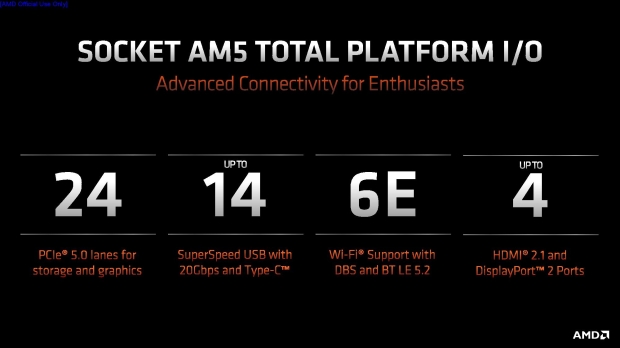
The new AM5 socket is capable of taking up to 230W of socket power delivery, with the Ryzen 9 7950X features a 170W TDP and 230W PPT, it won't be long (instantly) for that limit to be reached. AM5 introduces both DDR5 and PCIe 5.0 immediately, but future-proofing your system at the same time.
Will your old CPU cooler work? Yes, the new AM5 socket is backward compatible with most AM4 coolers. So, AMD might have moved away from AM4 into AM5, but it isn't shafting customers into needing to buy a new CPU cooler with their new Ryzen 7000 series "Zen 4" CPU.
DDR5 memory
DDR5 memory is joining the AMD party with the new AM5 socket and Ryzen 7000 series "Zen 4" processors, where even on the B650 chipset you'll still be able to join the next-gen goodness of DDR5 RAM. AMD supports DDR5-5200 memory out of the box, right up to DDR5-6400 memory, and beyond with EXPO DDR5 memory overclocking.
You'll need one of the new "Extreme" motherboards in the AMD X670E or B650E, which were designed to handle the higher speeds of overclocked DDR5 memory, as well as offer both PCIe 5.0 GPU and PCIe 5.0 SSD support -- at the same time, not only a PCIe 5.0 GPU or SSD -- because that's Extreme.
DDR5 ushers in much higher speeds than we have with DDR4 memory, with DDR4 maxing out at around DDR4-4000 specs while DDR5 is already hitting DDR5-6000+ in late 2021 while we're seeing DDR5-7000+ speeds and beyond already. AMD is ready with AM5 and the world of DDR5 memory, with its faster speeds, lower latencies, and higher capacities in-bound for next-gen PC gaming.
One of the big benefits of DDR5 memory technology is that it scales between laptops, improving their battery life while delivering more performance, right up to the highest-end gaming desktop PC with super-speed DDR5 memory inside on a new AM5 socket motherboard and Ryzen 7000 series "Zen 4" CPU.
AMD is supporting DDR5 memory on both its X670 and B650 motherboards, with EXPO technology handling overclocking for you.
PCIe 5.0 support
The upcoming fleet of AM5 motherboards from the likes of ASUS, MSI, and GIGABYTE will see new 600-series chipsets that will offer gamers and enthusiasts the world of PCIe 5.0 for both GPUs and SSDs. The non-E motherboards in the form of the X670 and B650 will only offer PCIe 5.0 GPU support, or PCIe 5.0 SSD support, not both at the same time.


PCIe 5.0 GPUs and PCIe SSDs at the same time -- that's "Extreme" and handled by the X670E and B650E motherboards -- but will give you support for up to 14-15GB/sec reads on next-gen PCIe 5.0-based SSDs.
In order to do both, you'll need the maximum 24 lanes of PCIe 5.0 that AMD offers inside of its flagship X670E platform and mid-range Extreme-based B650E, so you've got 16 lanes for a PCIe 5.0-based graphics card, and another 8 lanes for PCIe 5.0-powered SSDs. Then you can enjoy not one but two PCIe 5.0 x4 NVMe M.2 SSDs inside of your AM5 motherboard, and a PCIe 5.0 x16 graphics card and still rock and roll on the PCIe 5.0 lanes without bursting at the seams.
X670E, X670, B650E, B650 Chipsets
AMD has unveiled not one, not two but four new chipsets for its new AM5 socket, with the introduction of the new X670E, X670, B650E, and B650. The "E" in these chipsets is for "Extreme" which in laymen's terms means with "E" motherboards you'll get PCIe 5.0 for both GPUs and SSDs... where non-E boards only have a PCIe 5.0 GPU or a PCIe 5.0 SSD, not both at the same time.
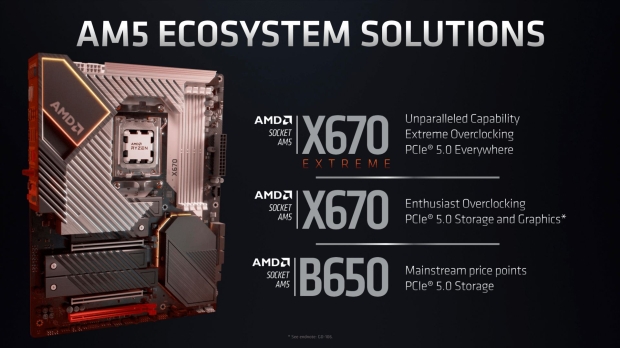
I think the higher-end X670E motherboards and the B650E motherboards are going to be very popular over the next 12-18 months, as they'll offer support for the new AM5 socket and Ryzen 7000 series "Zen 4" CPUs, as well as DDR5 memory, and PCIe 5.0 support for both GPUs and SSDs.
AMD is launching its new X670E and X670 motherboards the second that the new Ryzen 7000 series "Zen 4" processors launch on September 29, while the new B650E and B650 motherboards will arrive in October. AMD does tease that we will see new Zen 4-ready AM5 motherboards for as low as $125... I would expect that'll be for a B650-based motherboard.
- AMD X670 Extreme: Bringing the most connectivity and extreme overclocking capabilities with PCIe 5.0 support for graphics and storage
- AMD X670: Supporting enthusiast overclocking with PCIe� 5.0 support for storage and optional graphics support
- AMD B650E: Designed for performance users with PCIe� 5.0 storage support and optional graphics support
- AMD B650: Designed for mainstream users with support for DDR5 memory and optional PCIe� 5.0 support
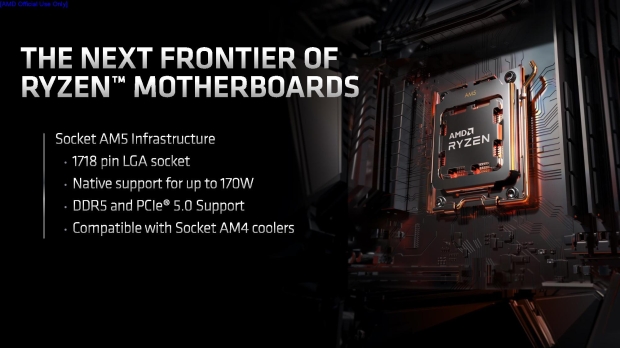
X670E + X670: the "E" is for Extreme
The flagship X670E chipset offers Extreme power, and will support dual PCIe 5.0 x16 graphics cards and a single M.2 NVMe SSD port, with the higher-end X670E motherboards packed and ready to go for overclocking to the max. If you are going to pick up the new Ryzen 9 7950X or Ryzen 9 7900X, then you're going to probably grab an X670E-based motherboard.
The regular X670 chipset isn't as Extreme, where we should see motherboard makers offering boards that support varying standards. X670 motherboards will have a PCIe 5.0 x16 interface for a next-gen graphics card, but the first graphics card is limited at its peak of PCIe 4.0 or PCIe 5.0 depending on the board.
We should see lower-cost X670 motherboards that have PCIe 4.0 x16 for the graphics card, as it shouldn't matter too much for the most part, while they will offer PCIe 5.0 x16 support on the higher-end SKUs of X670 motherboards.
B650E + B650: mid-range future-proof goodness
For the mainstream, AMD has its new B650E "Extreme" chipset which will have PCIe 5.0 compatibility for next-gen GPUs and SSDs of the future. We will see mid-range B650E and B650 motherboards featuring DDR5 memory support, making them future-proof into the future given the new AM5 socket + DDR5 memory + PCIe 5.0 support on mid-range motherboards.
AMD's regular non-Extreme B650 motherboards will have a single PCIe 5.0-capable M.2 SSD slot, but will only give you PCIe 4.0 x16 for the GPU. You won't find many upgraded power delivery systems on B650-based motherboards, so while they're overclocking-ready, don't go expecting to break OC world records on B650 motherboards with a Ryzen 9 7950X processor.
Final Thoughts
AMD has revealed quite an impressive lineup of products that will keep reviewers like us busy for many, many months... with the new Ryzen 7000 series "Zen 4" CPUs -- especially the Ryzen 9 7950X and Ryzen 5 7600X processors -- as well as the new X670E, X670, B650E, and B650 motherboards.

The company is stepping up onto equal ground and some against Intel, offering DDR5 and PCIe 5.0 support on its new Zen 4 platform. Intel offers DDR5 and PCIe 5.0 support on its 12th Gen Core "Alder Lake" platform as well as its upcoming 13th Gen Core "Raptor Lake" platform, which AMD's new Ryzen 7000 series "Zen 4" platform is going to compete against when they both launch.
You will be spending more money buying DDR5 memory, but the new AMD Ryzen 7000 series "Zen 4" CPUs aren't more expensive considering you are getting much more silicon grunt for your money over the Ryzen 5000 series "Zen 3" CPUs when they launched. You won't need to buy faster DDR5 in the future, and a PCIe 4.0 SSD is more than fast enough at 7.5GB/sec+ even if PCIe 5.0 SSDs will do 14GB/sec+ do you really need that?
- Read more: AMD Ryzen 7950X 'Zen 4' CPU delidded: gold-plated CCDs, looks gorgeous
- Read more: AMD's new B650E motherboards: 'E for Extreme' with PCIe 5.0 SSD + GPU
- Read more: AMD announces EXPO technology: overclock your DDR5 RAM with Zen 4 CPU
- Read more: AMD shows off next-gen RDNA 3 GPU with Ryzen 9 7950X CPU in gaming
Enthusiasts that want that "Extreme" Zen 4 experience will buy themselves a new Ryzen 9 7950X processor and X670E motherboard, throwing in what should be the world's first PCIe 5.0 graphics card -- AMD's upcoming flagship Navi 31-based Radeon RX 7900 XT -- and an ultra-fast next-gen PCIe 5.0 SSD that pushes out 14GB/sec+ reads.

The new mid-range Ryzen 5 7600X processor for $299 is some great value, especially when it can offer similar gaming performance against Intel's current flagship Core i9-12900K processor. Mix it with a new B650E motherboard and you've got a mid-range Zen 4 gaming beast PC.
- Read more: AMD's new Ryzen 9 7950X 'Zen 4' CPU: 16C/32T at up to 5.7GHz for $699
- Read more: AMD Ryzen 5 7600X 'Zen 4' CPU: 6C/12T at up to 5.3GHz for $299
- Read more: AMD Zen 4 CCD: 6.57 billion transistors on 5nm, 58% more than Zen 3
- Read more: AMD Ryzen 7000 series 'Zen 4' CPUs are official: September 27 launch
We'll have to wait and see what Intel can do against the Ryzen 5 7600X with its upcoming Core i5-13600K processor, and how competitive Intel is going to be with pricing... as I'm sure there's still a considerable chunk of Intel Core i5-12600K processors sitting around unsold.



